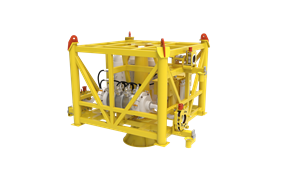The Modular Compact Pump: A game-changer in subsea multi-phase boosting
STAVANGER -- Oil companies are looking for ways to increase oil recovery rates. Subsea boosting can be a powerful tool, but investment costs are often too high, driven by expensive topside modifications and overall system cost. Operators also see other challenges, which are not currently solved by conventional systems--in particular, being able to provide sufficiently high boost for deep, long tie-back fields, as well as the avoidance of a barrier fluid system.

There are several standardization efforts ongoing which can somewhat reduce cost. To make a major change and unlock additional barrels of oil however, the industry needs a boosting system that breaks the mold, challenging the underlying cost structure. This is what the Modular Compact Pump (MCP) system from Baker Hughes, a GE company (BHGE) aims to achieve, redefining subsea boosting architecture, and enabling lower cost subsea boosting and unprecedented pressure boosting capability.
The MCP is a barrier-fluidless pump, significantly reducing requirements on topside space, as well as simplifying the umbilical, resulting in a highly cost-efficient system. The design consists of modules of independently controllable stages, with integrated motor-impellers rotating around a static central shaft. This avoids the rotor dynamic issues associated with conventional pumps, as well as the need for a mechanical seal. The modules can be stacked and built-up into larger systems depending on process needs. In theory, an unlimited number of stages can be stacked, resulting in ultra-high boosting capabilities. A typical pump would stack between four and 24 stages, giving a pump power ranging from 1 to 6 MW.
BHGE is developing the pump under a joint industry project (JIP) with several global operators and The Research Council of Norway, through its DEMO 2000 program, supporting the ongoing second phase of this JIP. It is this sort of collaboration between technologists from solutions providers and operators, coupled with smart ‘systems thinking’, that will be the key to introducing new solutions into this arena, thereby driving down costs and enabling simpler operations.
You can learn more by attending the ONS Technical Session ‘Technological quantum leaps: how technology changed industries,’ where Aslaug Melbø will share her insights in a presentation entitled ‘Bringing aviation technology into subsea boosting.' This session takes place on Wednesday, 29 August between 1 p.m.-3 p.m., in Hall 10.


